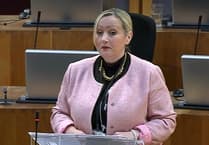Wales needs a dedicated minister responsible for child poverty and clear targets to tackle the scourge, a committee has recommended.
The Senedd equality committee has published a report after taking evidence on the Welsh Government’s draft child poverty strategy which was published in June.
Latest statistics show 28 per cent of children in Wales are living in relative income poverty – that is households where the total income is less than 60 per cent of the UK average.
Currently, social justice minister Jane Hutt is responsible for tackling child poverty but elements such as educational attainment and well-being sit with cabinet colleagues.
The committee called for a more joined-up approach, with one minister responsible for child poverty as well as children’s rights in key areas such as childcare and education.
Jenny Rathbone, who chairs the committee, said: “There are more children and young people in poverty than any other age group – we need to call time on child poverty.
“Children have no control over their circumstances, the hardship they face is imposed upon them. It is a burning injustice which sits awkwardly with any claim to be a country that promotes fair play.”
The recommendation of a dedicated minister echoes calls from Rocío Cifuentes – the children’s commissioner – who has criticised the draft strategy, saying it lacks ambition.
“Welsh Government must comprehensively revise its draft strategy,” she said. “It does not match the gravity of the situation facing children and young people in Wales today.”
In 2022, a survey of more than 8,000 children and young people found more than 60% of seven- to 11-year-olds worry about their family having enough money.
Nearly half of respondents were concerned about having enough to eat.
Targets
The committee raised concerns about the lack of targets and timescales in the draft strategy despite calls from the UN Committee on the Rights of the Child.
Chris Birt, from the Joseph Rowntree Foundation, highlighted the risk that government strategies can amount to little more than “nice warm words”.
“The most important element of these strategies is what you’re going to do about it and how you’re going to deliver on that,” he told the committee.
The report said the Welsh Government is reluctant to set targets because many of the policy levers for reducing inequalities and redistributing wealth sit with Westminster.
However, MSs stressed that the strategy should focus on what the Welsh Government can do to alleviate child poverty rather than what it cannot do.
Committee members heard international examples of best practice. In New Zealand, for example, the government is required by law to set targets to reduce child poverty.
Similarly, in Scotland, an independent Poverty and Inequality Commission was established in 2019 to advise ministers and monitor progress against targets.
Childcare
MSs also called for a commitment from Welsh ministers to ring fence extra funding that will flow to Wales from increased childcare spending in England for the same purpose.
The committee heard evidence from Nordic countries which have some of the lowest rates of child poverty in Europe.
Mari Rege, a professor at Norway’s University of Stavanger, raised the importance of universal early childhood education and care.
Prof Rege said few tools are as effective as childhood education in “breaking the cycle” of intergenerational poverty.
Ms Rathbone said international examples show that childcare and early education are crucial game-changers.
“We want the Welsh Government to invest money in seamless and affordable childcare,” said the Labour MS for Cardiff Central.
The report, Calling Time on Child Poverty, which was published on Monday October 6, makes six recommendations aimed at giving every child the best start in life.
The Welsh Government is expected to issue a formal response, accepting or rejecting each of the recommendations.




